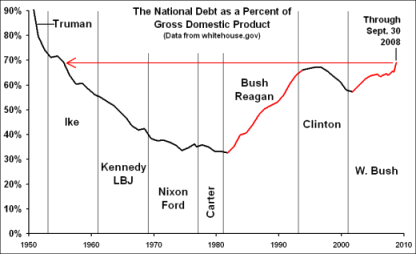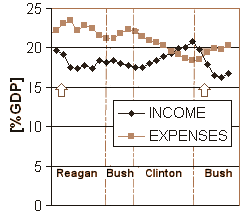Summary: The massive growth of hedge funds has sparked warnings of instability and demands that the industry be regulated. But the fear of hedge funds is overblown, based on a misunderstanding of their role in the international financial system. In reality, hedge funds do not increase risk; they manage it — and policymakers, rather than clamping down, should make sure hedge funds have the tools to perform this function well…
In the end, the critics of hedge funds would do well to remember why this sector has emerged as such a force. Until the late 1960s, the financial world was quaintly stable: exchange rates were inflexible, interest rates were regulated, and the whole system was anchored by a fixed gold price. But that world collapsed when inflation drove the dollar off the gold standard and currencies and interest rates began to float; from then on, it became impossible to amass savings without facing financial uncertainty. Tools for coping with that uncertainty — deep markets in futures, options, and other derivative instruments — sprang up in response to the newly volatile environment. And hedge funds emerged as the masters of these tools, providing quasi insurance to investors and firms and introducing a healthy dose of contrariness into financial markets. For this, they are accused of generating risk. But their real systemic function is to manage it – and it is their very success in doing so that has generated both their profits and their phenomenal growth.
Post-war international gold standard (1946–1971)
After the Second World War, a system similar to the Gold Standard was established by the Bretton Woods Agreements. Under this system, many countries fixed their exchange rates relative to the US dollar. The US promised to fix the price of gold at $35 per ounce. Implicitly, then, all currencies pegged to the dollar also had a fixed value in terms of gold. However, under the fiscal strain of the Vietnam War, President Richard Nixon eliminated the fixed gold price in 1971, causing the system to break down.

 In Hedge Fund parlance, Reagan "went short" on our economy. He "leveraged" our government and military. And the Bush father/son team continued his lead. Under the same guise as the Hedge Fund Managers, these Republican Administrations told us they were making us safe, but what they did was put us at risk. The Hedge Fund mentality wasn’t because of something, it was part of something – something sometimes called Reaganomics, sometimes called Compassionate Conservatism, but rarely what it really is, Deficit Spending.
In Hedge Fund parlance, Reagan "went short" on our economy. He "leveraged" our government and military. And the Bush father/son team continued his lead. Under the same guise as the Hedge Fund Managers, these Republican Administrations told us they were making us safe, but what they did was put us at risk. The Hedge Fund mentality wasn’t because of something, it was part of something – something sometimes called Reaganomics, sometimes called Compassionate Conservatism, but rarely what it really is, Deficit Spending. Sebastian Mallaby goes on, "from then on, it became impossible to amass savings without facing financial uncertainty." Again, he is implying that financial uncertainty became a problem because of some world economic thing, "inflation." Wrong again, the uncertainty came from floating the dollar to pay for the Viet Nam War. Whatever the case, Mallaby justifies Hedge Funds as a way to amass savings without facing financial uncertainty failing to mention that they are only available to the already very wealthy.
Sorry, the comment form is closed at this time.